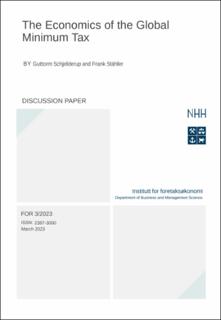The Economics of the Global Minimum Tax
| dc.contributor.author | Schjelderup, Guttorm | |
| dc.contributor.author | Stähler, Frank | |
| dc.date.accessioned | 2023-03-14T10:56:01Z | |
| dc.date.available | 2023-03-14T10:56:01Z | |
| dc.date.issued | 2023-03-14 | |
| dc.identifier.issn | 2387-3000 | |
| dc.identifier.uri | https://hdl.handle.net/11250/3058117 | |
| dc.description.abstract | This paper shows that the OECD inclusive framework of Pillar Two fails to implement the claimed 15% minimum corporate tax for subsidiaries of multinational corporations. The reason is that the Substance-based Income Exclusion of Pillar Two allows to tax-deduct payroll costs and user costs of intangible assets twice from the tax base of the top-up tax. Employing a standard multinational firm model, we show that Pillar Two dampens tax motivated transfer pricing, but changes the employment, investment and import incentives. For a sufficiently large cost share of labor and/or capital, the Substance-based Income Exclusion is equivalent to a production subsidy. | en_US |
| dc.language.iso | eng | en_US |
| dc.publisher | FOR | en_US |
| dc.relation.ispartofseries | Discussion paper;3/23 | |
| dc.subject | Corporate taxation | en_US |
| dc.subject | BEPS | en_US |
| dc.subject | Pillar Two | en_US |
| dc.subject | minimum tax | en_US |
| dc.title | The Economics of the Global Minimum Tax | en_US |
| dc.type | Working paper | en_US |
| dc.source.pagenumber | 21 | en_US |
Tilhørende fil(er)
Denne innførselen finnes i følgende samling(er)
-
Discussion papers (FOR) [564]
